Love is the closest thing to magic. While love can often be conditional, unconditional love can make us do the craziest things and also completely transform us for better or worse. However, there is a unique and often overlooked form of affection known as storge love. But what is storge love?
Imagine a love that blossoms within the comforting walls of familiarity, nurturing bonds that withstand the test of time. A love that is born, not from passion or desire, but from a deep sense of connection and shared experiences. This is the essence of storge love that thrives within the realm of family relationships.
So today, let us understand what is storge love, explore the characteristics of storge love and shed light on the psychological perspectives on storge love.
What is Storge Love?
Storge love, also known as familial love or affectionate love, refers to the natural bond that emerges between family members. Unlike passionate or romantic love, which is often intense and driven by desire, storge love is characterized by a deep sense of familiarity, trust, and unconditional acceptance.
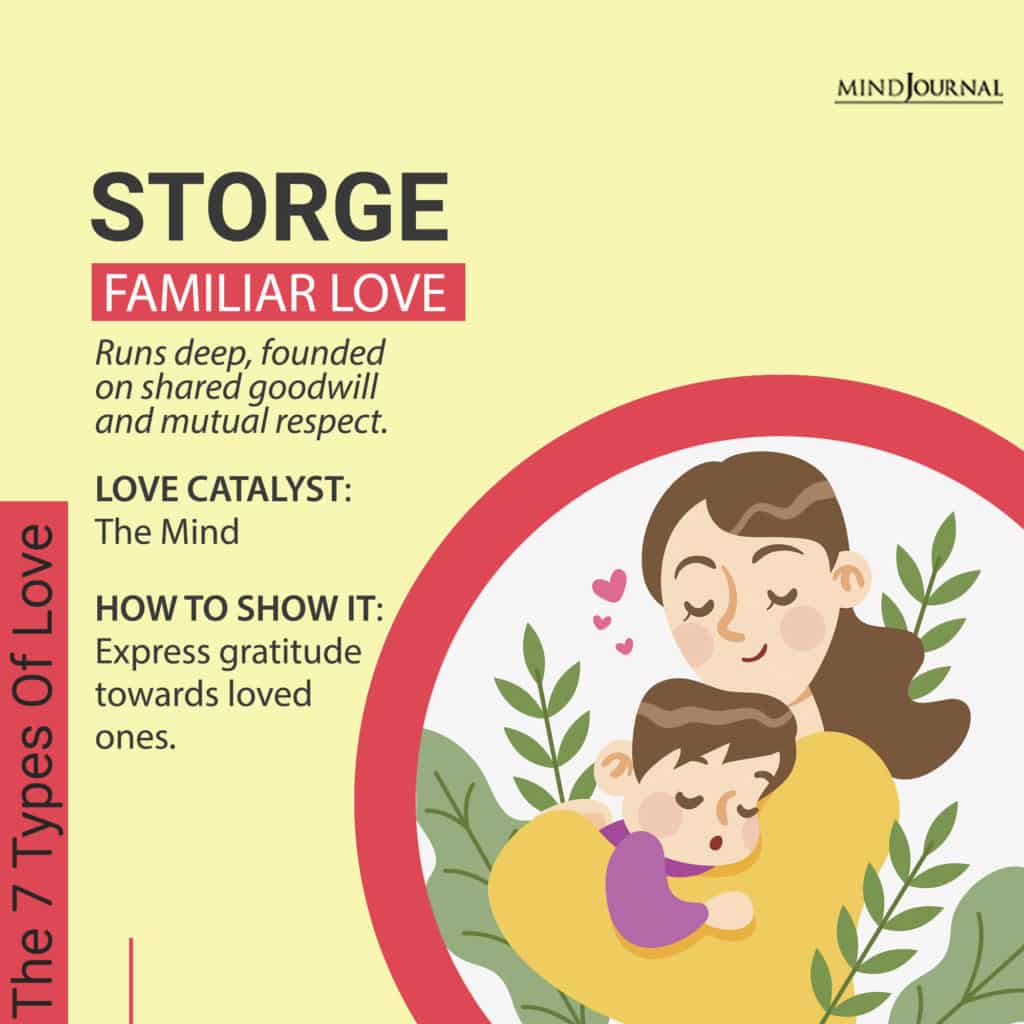
It is the love between siblings, parents and children, and extended family members, forming the cornerstone of familial relationships. It’s the comfort of home-cooked meals, the warmth of a hug from a grandparent, or the laughter shared during holiday gatherings.
So what is storge love? It is the bond between siblings who may bicker but ultimately stand up for each other. For instance, consider the case of the Johnson family. Despite their busy lives, they prioritize spending quality time together.
Whether it’s game nights, Sunday dinners, or supporting each other through tough times, their storge love keeps them connected and resilient.
Related: 7 Types Of Love In Greek Philosophy Other Than Romantic Love
What are the Characteristics of Storge Love?
Storge love, rooted in familial bonds, is marked by warmth, loyalty, and a sense of belonging among family members. Here are some of the most defining characteristics of storge love –
1. Nurturing and Protective
Storge love is rooted in a nurturing and protective instinct. It fosters an environment of care, support, and guidance, where family members prioritize each other’s well-being.
Whether it’s a parent shielding their child from harm or siblings providing comfort during difficult times, storge love acts as a shield against the challenges of life.
2. Shared Experiences
One of the defining characteristics of storge love is the accumulation of shared experiences. Growing up together, facing triumphs and tribulations, and witnessing each other’s growth strengthens the bond between family members.
These shared memories create a profound sense of belonging and understanding, fostering a unique connection that withstands the trials of time.
3. Unconditional Acceptance
Storge love embraces imperfections and celebrates the uniqueness of each individual within the family unit. It is a love that transcends flaws and shortcomings, accepting and cherishing family members for who they are.
This unconditional acceptance provides a safe haven where individuals can freely express themselves without fear of judgment or rejection.
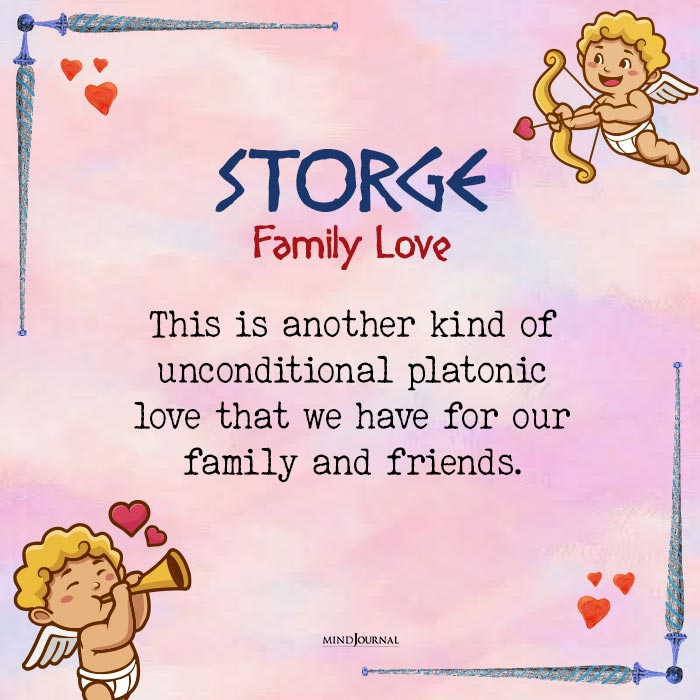
4. Stability and Dependability
Storge love provides a stable foundation within the ever-changing facets of life. Family members can rely on each other during times of need, knowing that their loved ones will be there to offer unwavering support.
This stability creates a sense of security and reassurance, fostering emotional well-being and resilience.
Now that we know what is storge love and its characteristics, let’s take a look at the psychology behind this form of affection.
Related: The Eight Kinds Of Love According To Ancient Greeks
Understanding the Psychological Perspectives on Storge Love
Ever wondered about the psychological secrets that lie behind the love shared within families? Let’s explore the psychological nuances of storge affection
1. Attachment Theory
Attachment theory, developed by psychologist John Bowlby, sheds light on the significance of storge love in early childhood development. According to this theory, a secure and nurturing attachment between infants and their primary caregivers, usually parents, lays the groundwork for healthy emotional and social development.
Storge love plays a crucial role in creating a secure attachment, enabling children to explore the world with confidence and develop trusting relationships later in life.
2. Family Systems Theory
Family Systems Theory, pioneered by psychologist Murray Bowen, emphasizes the interconnectedness of family members within a system. Storge love is seen as a driving force in maintaining family cohesion and functioning.
This theory recognizes that the love and support exchanged within the family unit directly impact individual well-being and the overall harmony of the family system.
3. Social Learning Theory
Social Learning Theory, proposed by psychologist Albert Bandura, suggests that individuals acquire behaviors and attitudes through observation and imitation. Within the context of storge love, children learn how to love and form relationships by modeling the behaviors and dynamics they observe within their family.
Positive experiences of storge love within the family unit can serve as a blueprint for healthy and fulfilling relationships in other areas of life.
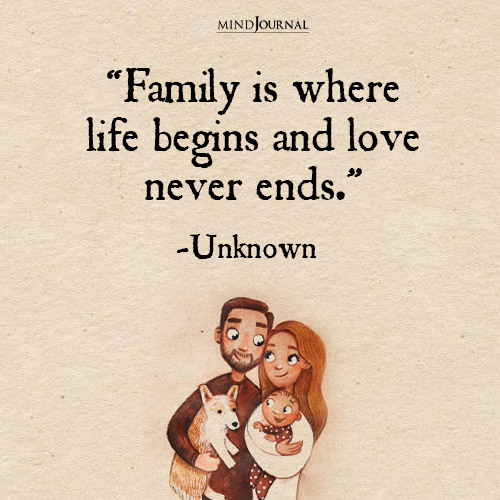
Takeaway
So what is storge love? Storge love, with its nurturing nature, shared experiences, unconditional acceptance, and stability, plays a vital role in shaping our lives. It is the love that binds families together, providing a sanctuary of support, understanding, and affection.
By understanding the characteristics and psychological perspectives of storge love, we can appreciate its significance and foster its growth within our own families. Let us embrace the power of storge love and celebrate the unbreakable bonds that enrich our lives.
Related: 40+ Quotes About Family That Embrace the Chaos, Love, and Eternal Bonds
Frequently Asked Questions (FAQs):
What is a storge type of love?
Storge love, also known as familial love, is the deep bond and affection shared among family members.
What is the difference between storge and agape love?
Unlike agape love, which is selfless and unconditional, storge love is rooted in familial connections and shared experiences.
What is an example of storge love style?
A classic example of storge love is the unwavering support and care exchanged between siblings throughout their lives.


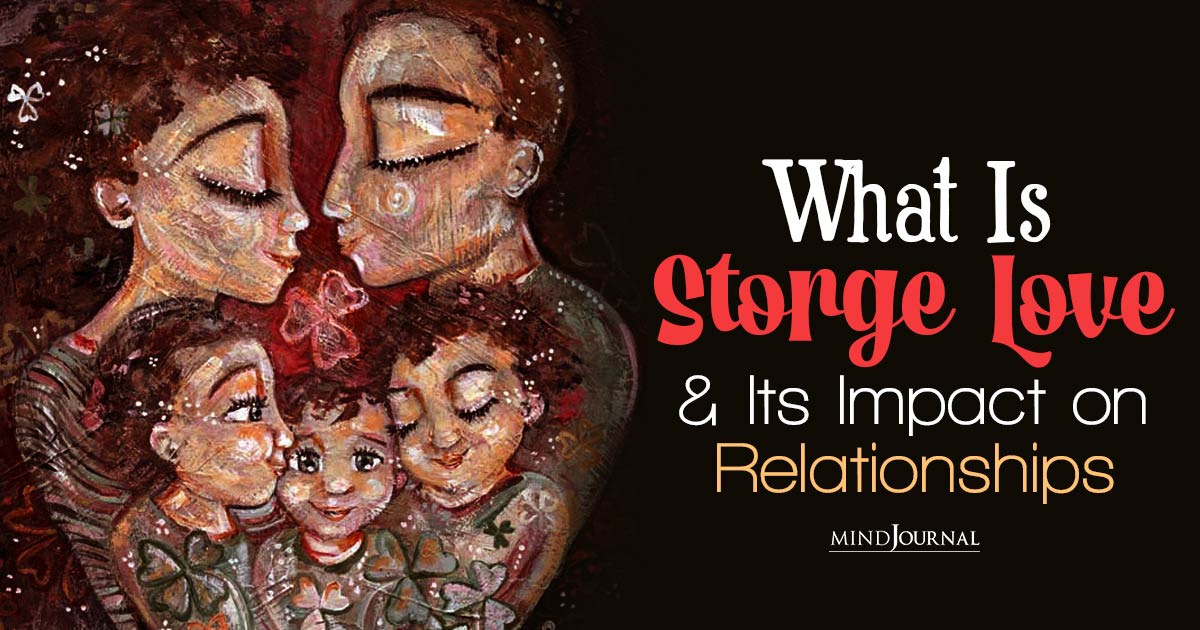






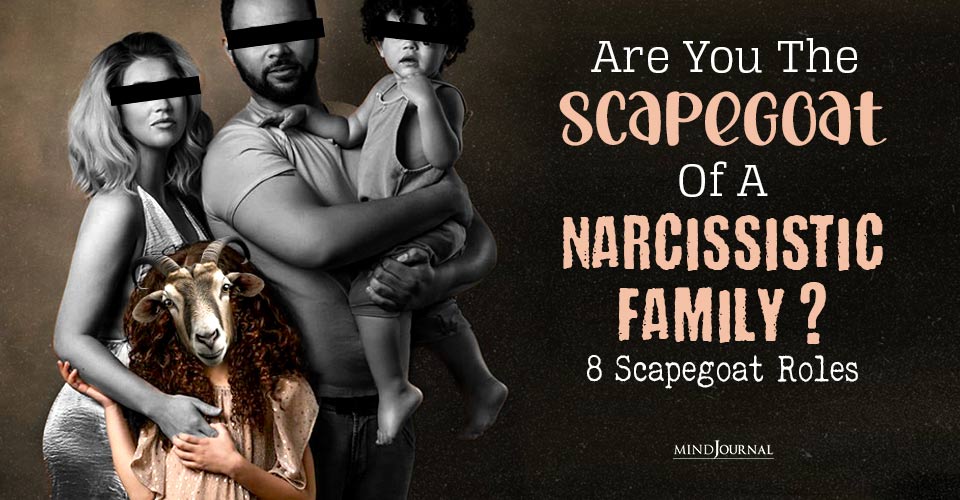
Leave a Reply